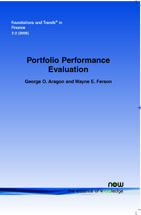Portfolio Performance Evaluation
By George O. Aragon, W.P. Carey School of Business, Arizona State University, George.Aragon@asu.edu | Wayne E. Ferson, Marshall School of Business, University of Southern California, ferson@marshall.usc.edu
Abstract
This paper provides a review of the methods for measuring portfolio performance and the evidence on the performance of professionally managed investment portfolios. Traditional performance measures, strongly influenced by the Capital Asset Pricing Model of Sharpe (1964), were developed prior to 1990. We discuss some of the properties and important problems associated with these measures. We then review the more recent Conditional Performance Evaluation techniques, designed to allow for expected returns and risks that may vary over time, and thus addressing one major shortcoming of the traditional measures. We also discuss weight-based performance measures and the stochastic discount factor approach. We review the evidence that these newer measures have produced on selectivity and market timing ability for professional managed investment funds. The evidence includes equity style mutual funds, pension funds, asset allocation style funds, fixed income funds and hedge funds.
Portfolio Performance Evaluation
Portfolio Performance Evaluation reviews the academic literature on evaluating portfolio performance, focusing on professionally managed investment portfolios. Recent years have witnessed an explosion of new methods for performance evaluation and new evidence on the subject. Portfolio Performance Evaluation provides a selective review of the methods for measuring portfolio performance and the evidence on the performance of professionally managed investment portfolios. There is also a discussion of hedge funds presenting unique challenges for measuring risk adjusted performance and for interpreting performance measures. Portfolio Performance Evaluation summarizes the historical evidence on the performance of mutual funds and hedge funds using actual data.
